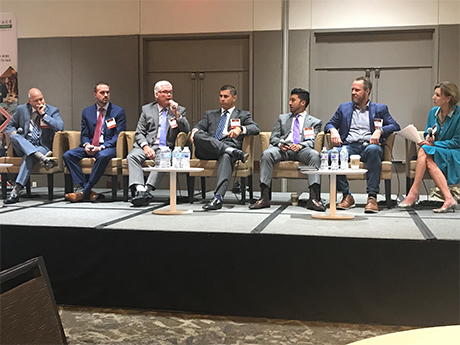Tariffs, Election Impact Deal Velocity in DFW Industrial Market, Says InterFace Panel
The InterFace DFW Industrial leasing and capital markets panel, from left to right: Mark Graybill of Lee & Associates; Brad Struck of ESRP; Rick Medinis of NAI Robert Lynn; Blake Kendrick of Stream Realty Partners; Adam Abushagur of Marcus & Millichap; Ward Richmond of Colliers International; and moderator Coni Hennersdorf of CODA Consulting Group.
DALLAS — The 2020 presidential election as well as tariffs, the primary economic weapon of the incumbent candidate, are weighing heavily on the decisions of industrial users and investors in Dallas-Fort Worth (DFW), according to a panel of experienced leasing and capital markets professionals at the InterFace DFW Industrial conference.
Moderated by Coni Hennersdorf, principal of CODA Consulting Group, the event was held Sept. 4 at the Westin Galleria Hotel and attended by more than 200 people in its first year of existence.
The panelists agreed that President Donald Trump’s tariffs, which at this point primarily target goods imported from China, have prompted some industrial users to stockpile inventories in advance of the tariffs going into effect. According to the Wall Street Journal, since July 2018, the administration has imposed tariffs on more than $250 billion worth of Chinese goods, not including the additional $150 billion in tariffs set to take effect in mid-December.
Other tenants have opted to wait out the election and see if the tariffs will be repealed, effectively delaying key decisions on capital expenditures like labor and materials. The former scenario creates more demand for industrial space, while the latter puts potential expansion deals on hold.
On the investment front, some industrial developers and owners are motivated to sell because tariffs on building materials like steel, aluminum, tile and concrete have driven up their costs on prospective new projects. Consequently, some of these firms are now looking to free up capital. Other landlords are also leaning toward the “kick the can down the road” approach and banking their sell-or-hold decisions on the outcome of the election.
DFW industrial leasing agents and investment sales brokers, which comprised the panel, are both enjoying the upticks and feeling the pain from the tariffs. Which side of the coin they fall on depends squarely on the types of clients they represent.
Investment Dilemma
Adam Abushagur, first vice president of investments in Marcus & Millichap’s Dallas office, addressed the impacts of the trade dispute and the upcoming election on macroeconomic and geopolitical forces on investment sales in the local market.
Abushagur pointed out that uncertainty about the direction of interest rate movement prompted a slow start to the year, but that the rapidly approaching election and unresolved trade disputes have since rejuvenated deal velocity, particularly with regard to Class B industrial product under 100,000 square feet.
“We’ve had a huge influx of new inventory hit the market over the last 60 days, and the upcoming election is a big driver of that,” he said. “We’re seeing a lot of sellers that are ready to move, particularly if their strategy involved selling in the next two to three years. Plus a lot of buyers have year-end requirements to meet. So we should see more supply coming to market and softening prices a little bit.”
Referencing a study his firm conducted on how presidential elections impact deal volume, Abushagur pointed out that in both 2012 and 2016, national industrial transaction volume declined by 18 percent, compared to 2011 and 2015, respectively.
“In terms of buyer sentiment, there’s a lot of uncertainty of what’s on the horizon,” he said. “That, not pricing, has pushed buyers back. With deal velocity decreasing, cap rates are likely to go up.”
Underscoring the theme of the tariffs and election exerting different effects on different types of players, Abushagur noted that his team has seen more sale-leaseback deals this year. Although buyers may be feeling a bit gun-shy right now, owner-occupiers hit by tariffs need to free up additional capital, and sale-leasebacks provide the comfort of immediate cash flows after closing.
— Taylor Williams
Read more: ReBusiness Online
